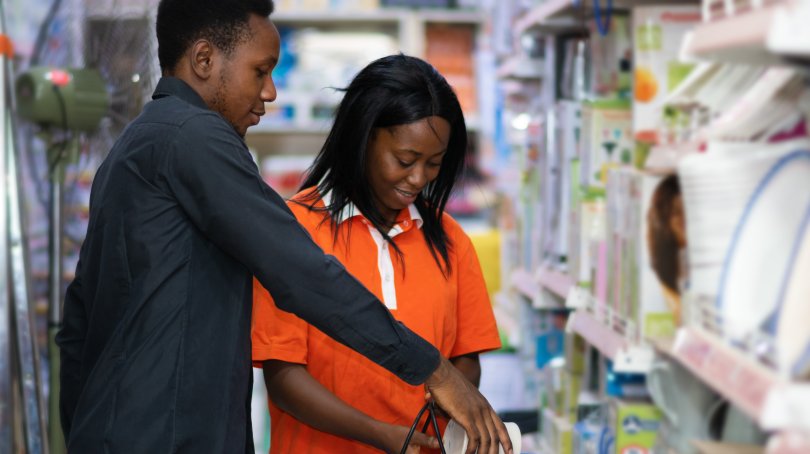A good wife? When marital reputation shapes economic choices

Fresh product market in a village near Kasungu National Park, Malawi. Credits : Lex Hes & Boundless Southern Africa via flickr
To buy or not to buy? When we weigh the decision to purchase something, a multitude of factors come into play. But is our partner’s opinion among them? This question becomes especially critical in households where incomes are extremely limited. To investigate, three economists recently carried out a large-scale experiment in Malawi.
Are our purchases truly driven by rational, consistent choices that aim to maximise well-being while minimising costs? This is the assumption at the heart of neoclassical economics, which relies on the theoretical figure of the homo economicus—a rational, self-directed economic agent. Yet this model has long been contested. Cognitive biases, emotional influences, and the weight of social dynamics all shape the decisions we make.
Consider, for example, the breadmaking machine you purchased last year under your partner’s skeptical gaze. Used once or twice at most, it now gathers dust on the kitchen counter. Now, when the idea of buying a soda maker – praised enthusiastically on social media – crosses your mind, you might hold back, already imagining your partner’s disapproving looks. While such dilemmas may seem trivial, the stakes are far greater in households with tight budgets, where financial decisions carry real consequences.
Take the case of a woman in a low-income household, responsible for everyday purchases using money provided by her husband. This dynamic is common in many developing countries, particularly in sub-Saharan Africa. Could a husband’s judgment cause his wife to hesitate before making a risky but potentially beneficial purchase—such as buying unfamiliar seeds a merchant claims will yield more abundant harvests?
That is precisely the question that drew the attention of economists Nina Buchmann, Pascaline Dupas, and Roberta Ziparo. Experts in development economics, the trio launched a large-scale experiment in Malawi, a rural country of 18 million people in East Africa, and one of the world’s poorest nations.
A question of reputation?
The economists' hypothesis was inspired by two earlier studies. In 2007, Pascaline Dupas sought to determine whether the purchase price of a mosquito net—a key tool in the fight against malaria—affected how likely it was to be used. To test this, Kenyan households were given vouchers that altered the final cost of the net. The findings challenged prevailing assumptions: receiving the net for free did not reduce its usage. However, one detail stood out. Women were more inclined to purchase the net when the voucher was issued to both members of the couple, rather than to the woman alone. This suggested a hesitation to make purchases whose value their husbands could not directly assess 1 .
A second study, conducted the previous year in Zambia by a different team, looked at the effect of pricing on the uptake of chlorine bottles used to purify drinking water
2
. Among the subset of women who had never used chlorine before, researchers observed a revealing pattern: married women who paid for the product were more likely to use it than those who received it at no cost
3
. But this behavioural difference did not appear among single women. Being married, it seemed, encouraged women to use a product more consistently—particularly when money had been spent on it. Perhaps to avoid appearing wasteful or irresponsible in the eyes of their husbands?
Intrigued by this pattern, Nina Buchmann, Pascaline Dupas, and Roberta Ziparo decided to dig deeper. Interviews conducted in Ghana in 2017 reinforced their suspicions. In conversations, several wives shared that bringing a new product home could, in fact, lead their husbands to reduce the amount of money they provided—especially if the item turned out to be of little practical use.
- 1
Dupas P., 2009, "What Matters (and What Does Not) in Households' Decision to Invest in Malaria Prevention?" American Economic Review, 99 (2): 224–30.
- 2
Ashraf N., Berry J. and Shapiro J.M., 2010, “Can Higher Prices Stimulate Product Use? Evidence from a Field Experiment in Zambia” American Economic Review, 100 (5) : 2383-2413
- 3
Adding chlorine to drinking water can purify it, but also adds a flavour that may be off-putting.
Mistakes that can be costly
To directly examine how purchasing strategies are shaped by marital dynamics, the three researchers conducted a large-scale experiment in Malawi. Their investigation began with two games—adapted from classic lab experiments but carried out in the homes of married couples. These games were carefully designed to reflect the gendered division of responsibilities commonly observed in Malawi.
In the first game, husbands were each given 600 kwacha (the local currency) and offered the option to transfer a portion of that sum to their wives. If they did so, the transferred amount would be doubled by the researchers. Some men made their decision right away. Others were first asked to recall their wives’ most recent purchases.

A wad of kwachas banknotes, the currency used in Malawi. Credits : Africa via Adobestock
The results were telling: men who remembered a poor purchasing decision by their wives gave them less money. This confirmed that a negative purchasing reputation can indeed affect how much financial autonomy a wife is granted. But were the wives themselves aware of this reputational risk?
To explore that question, the second game focused on the women. They were asked to evaluate the quality of six everyday household items—such as toothbrushes, razors, and flour. Afterward, they were offered a financial incentive to allow their test results to be shared with their husbands. Before making that choice, however, they had the option to spend part of the compensation to improve their scores—effectively modifying the results. The findings revealed a clear pattern: women whose evaluations were the least accurate were less willing to share their results with their husbands. And when they did choose to share, they were more likely to spend money to enhance their scores—an effort to conceal their lack of expertise.
A real-world experiment
These preliminary steps suggested that wives’ purchasing strategies are influenced by a fear of damaging their reputation in the eyes of their husbands. But how could this hypothesis be tested in real-life conditions? The most reliable method was to use randomised controlled trials (RCTs).
This approach involves selecting individuals with similar characteristics and randomly assigning them to two groups. Only one group receives the intervention being studied. Since that intervention is the only difference between the two groups, any observed changes can be attributed to it. Borrowed from clinical trials in medicine – used since the 1950s – this method was adapted to evaluate anti-poverty programs in low-income countries and earned Esther Duflo, Abhijit Banerjee, and Michael Kremer the Nobel Prize in Economics in 2019.
In the case of P. Dupas and colleagues’ study, the randomised trial took place at the Zomba market, one of the largest in Malawi, and involved over 600 married women. Each participant completed a questionnaire that assessed her purchasing skills. Based on this, women were classified according to their level of competence. The participants were then offered the opportunity to purchase two unfamiliar products. The first was a storage bag designed to protect harvested crops like maize and beans. A label explained that the bag, which could be sealed tightly, helped shield food from insect damage. This purchase was considered low-risk for a wife's reputation: if the bag turned out to be ineffective, she could simply use it like any other storage sack, and her husband would likely be none the wiser. The second item, however, posed a higher reputational risk: a foreign children's book – rare in Malawi – promoted as beneficial to child development. If the book went unused, it would remain visibly untouched on a shelf, making it easy for a husband to notice and potentially judge the decision. The experiment aimed to compare the behaviour of more competent (and presumably more trusted) women with that of less competent ones, while systematically varying what information their husbands received about the cost and usefulness of each product.

A young Malawi woman sewing a bag of rice. Credits : Swathi Sridharan via Flickr
Protecting one’s reputation
The findings were striking. While the most skilled women – those with strong purchasing expertise – bought the unfamiliar items regardless of what information their husbands received, women with less expertise were more cautious. They were significantly less likely to invest unless they were certain their husbands had been informed of the item’s price and/or utility.
Their hesitation was especially pronounced when a poor purchase would be difficult to hide. In other words, the less confident a woman was in her decision, the more she avoided buying something that could visibly backfire. The experiment suggests that women may be reluctant to try new products: if the purchase turns out to be ill-judged, they risk having their household allowance reduced or may feel compelled to hide their mistake by continuing to use an underperforming product.
Follow-up interviews conducted in Kenya in 2023 reinforced these conclusions. One-third of the men surveyed said they would reduce the money given to their wives if they made unsatisfactory purchases. On the other side, more than half of the women (56%) said they speculate on their husband’s likely reaction when deciding what to buy. A further one-third admitted to continuing to use – or pretending to use – a disappointing product to avoid revealing the poor outcome to their spouse.
Rethinking gender in economics
The experiment clearly demonstrates the influence of a partner’s gaze on a spouse’s purchasing decisions. This influence can have a significant impact in countries where incomes are low and where many women rely on the money provided by their husbands. But beyond that, the study challenges conventional assumptions about women's economic behaviour.
Women are often believed to be more cautious investors than men—supposedly more risk-averse, more conservative in their financial decisions. For years, they have been the preferred targets of development aid programs, based on the idea that they manage resources more prudently. Yet the experiment in Malawi suggests that women’s risk-taking is not fixed; it varies according to the social context in which they operate. In this case, women who were less concerned about damaging their reputation were actually more willing to take risks than their peers.

A picture of a young nigerian couple shopping for groceries at the supermarket. Credits : Constance via AdobeStock
This finding aligns with other recent research, such as that of Renée B. Adams, who showed that female board members in the finance sector were less risk-averse than other women
4
. Together, these insights push us to deconstruct persistent gender stereotypes. Economic behaviour is shaped less by inherent gender traits than by the socio-economic roles and expectations imposed on individuals.
Having already dismantled the myth of homo economicus, isn’t it time we also laid to rest the outdated clichés surrounding so-called "feminine" behaviours in economics?
- 4
Adams R. B., 2025 « Les femmes (et les hommes) dans la finance ne sont pas ‘typiques’ » Revue d'économie financière, 157(1) : 31-45.













